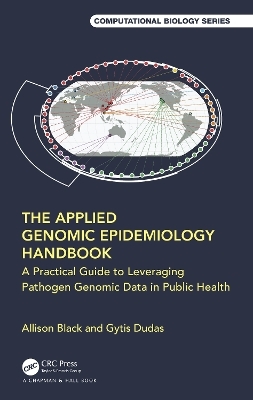
The Applied Genomic Epidemiology Handbook
Chapman & Hall/CRC (Verlag)
978-1-032-53026-0 (ISBN)
The Applied Genomic Epidemiology Handbook: A Practical Guide to Leveraging Pathogen Genomic Data in Public Health provides rationale, theory, and implementation guidance to help public health practitioners incorporate pathogen genomic data analysis into their investigations. During the SARS-CoV-2 pandemic, viral whole genome sequences were generated, analyzed, and shared at an unprecedented scale. This wealth of data posed both tremendous opportunities and challenges; the data could be used to support varied parts of the public health response but could be hard for much of the public health workforce to analyze and interpret, given a historical lack of experience working with pathogen genomic data.
This book addresses that gap. Structured into eight wide-ranging chapters, this book describes how the overlapping timescales of pathogen evolution and infection transmission enable exploration of epidemiologic dynamics from pathogen sequence data. Different approaches to sampling and genomic data inclusion are presented for different types of epidemiologic investigations. To support epidemiologists in diving into pathogen genomic data analysis, this book also introduces the analytic tools and approaches that are readily used in public health departments and presents case studies to show step-by-step how genomic data are used and evaluated in disease investigations.
Despite the breadth of scientific literature that uses pathogen genomic data to investigate disease dynamics, there remains little practical guidance to help applied epidemiologists build their ability to explore epidemiologic questions with pathogen genomic data. This handbook was written to serve as that guide. Including case studies, common methods, and software tools, this book will be of great interest to public health microbiologists or lab directors, bioinformaticians, epidemiologists, health officers, academics, as well as students working in a public health context.
Allison Black is a genomic epidemiologist passionate about strengthening public health’s ability to use pathogen genomic data for outbreak response, disease surveillance, and decision-making. While she trained as an academic genomic epidemiologist, she now leads molecular epidemiology activities at the Washington State Department of Health. Gytis Dudas is an evolutionary biologist at Vilnius University's Life Sciences Center working on RNA virus evolution at both long- and short-term scales. Most of Gytis' PhD and postdoctoral work focused on the genomic epidemiology of Ebola virus in West Africa and MERS coronavirus in the Arabian Peninsula.
Chapter 1 ■ The Value of Pathogen Genomics in Applied Epidemiology
Allison Black and Gytis Dudas
Chapter 2 ■ Fundamental Theory in Genomic Epidemiology
Allison Black and Gytis Dudas
Chapter 3 ■ Sample Selection
Allison Black
Chapter 4 ■ Public Health Use Cases of Genomic Epidemiology
Allison Black
Chapter 5 ■ Case Studies in Applying Genomic Epidemiology
Allison Black and Gytis Dudas
Chapter 6 ■ Tools and Methods for Applied Genomic Epidemiological Analysis
Allison Black and Gytis Dudas
Chapter 7 ■ A Deeper Dive into Viral Genomic Complexity
Gytis Dudas
Chapter 8 ■ Genomic Epidemiology of Bacteria
Taj Azarian and Allison Black
| Erscheinungsdatum | 20.03.2024 |
|---|---|
| Reihe/Serie | Chapman & Hall/CRC Computational Biology Series |
| Zusatzinfo | 2 Line drawings, color; 40 Halftones, color; 2 Halftones, black and white; 42 Illustrations, color; 2 Illustrations, black and white |
| Sprache | englisch |
| Maße | 156 x 234 mm |
| Gewicht | 300 g |
| Themenwelt | Medizin / Pharmazie ► Medizinische Fachgebiete ► Mikrobiologie / Infektologie / Reisemedizin |
| Studium ► 2. Studienabschnitt (Klinik) ► Humangenetik | |
| Studium ► Querschnittsbereiche ► Epidemiologie / Med. Biometrie | |
| Naturwissenschaften ► Biologie ► Genetik / Molekularbiologie | |
| Technik ► Elektrotechnik / Energietechnik | |
| Technik ► Umwelttechnik / Biotechnologie | |
| ISBN-10 | 1-032-53026-X / 103253026X |
| ISBN-13 | 978-1-032-53026-0 / 9781032530260 |
| Zustand | Neuware |
| Informationen gemäß Produktsicherheitsverordnung (GPSR) | |
| Haben Sie eine Frage zum Produkt? |
aus dem Bereich


